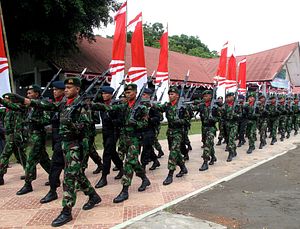Last week, Indonesia’s legislature approved previous defense arrangements forged between the Southeast Asian state and the United States. While the approval was in line with Indonesia’s domestic processes for foreign-related deals of this sort, it nonetheless reinforced the ongoing development of the defense aspect of the U.S.-Indonesia relationship.
As I have observed previously, the United States and Indonesia share a defense relationship that has included components such as visits, exchanges, and regular exercises, with past restrictions in the 1990s largely lifted under the George W. Bush administration. Defense ties have continued to be forged under the Trump administration as well despite some challenges and uncertainties for both sides, including the U.S. position on the Israel-Palestine issue and the environment of heightened U.S.-China competition. Last year, as both sides commemorated the 70th anniversary of the establishment of their diplomatic relations, we continued to see some manifestations of the developments in ties, be it military sales or exercises.
Last week, U.S.-Indonesia defense ties were in the headlines again with the legislative approval of previous defense arrangements. A commission in Indonesia’s legislature approved a plan for the Indonesian navy to receive drones and helicopter upgrades from the U.S. government, which had dated back several years.
Per the official account of the development issued by Indonesia’s defense ministry (KEMHAN), on February 26, the Indonesian House of Representative’s commission on defense, intelligence, and foreign affairs (Komisi I) approved a plan for the navy to receive up to 14 ScanEagle unmanned aerial vehicles (UAVs) and upgrades for three Bell 412 helicopters from the U.S. government, which was part of the capacity-building program for Southeast Asian navies initially known as the Maritime Security Initiative (MSI).
According to the account by KEMHAN, the approval proceeded in a routine fashion, beginning with an official submission of a request to the commission by Indonesia’s Deputy Defense Minister Sakti Wahyu Trenggono, who noted the evolution of the process thus far, including the initial Foreign Military Financing (FMF) offered to the Indonesian military. Then the defense ministry conducted a review of the deal to evaluate its technical, economic, political, and strategic aspects, as well as the intended use of the equipment by the navy while ensuring various considerations including data security and integrating it with existing capabilities. The commission then approved the request in principle while reminding the defense ministry of prioritizing certain considerations including data confidentiality and managing burdens on the national budget.
The approval itself was not surprising and is consistent with the broader current process Indonesia goes through for foreign-related defense grants. Nonetheless, it has significance in terms of the additions to Indonesia’s defense capabilities. And more generally, it also reinforced the role that the United States continues to play in Indonesia’s military modernization and the continued development of the defense aspect of the U.S.-Indonesia relationship more generally.

































